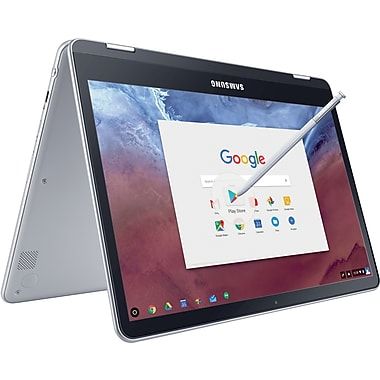The case for Chromebooks

Technology is important to all of us in academia, and arguably there's no more important technology for faculty than the computers that we choose to use for our work. Computers are the fundamental tool in the arsenal of the modern professor. For me, my "weapon of choice" since the mid-2000's has been the Macbook Pro. But recently, I experimented with a very different approach to computer hardware: the Chromebook.
Chromebooks are laptops that run the Chrome OS operating system developed by Google. Back when they were first introduced in 2009, Chromebooks and Chrome OS were definitely niche products. Basically they were netbooks that did nothing but run the Chrome browser --- a browser with a keyboard, more or less, with little to no functionality if you were offline. The were cheap, almost disposable devices that did one thing: Surf the web. So for people in academia, they didn't make a blip on the radar.
But Chromebooks have come a long way since then. Today, there is an entire range of Chromebook devices all the way from cheap, kid-tested models for under $200 all the way to the astonishingly high-end Pixelbook, made by Google itself, the highest-end of which rocks an Intel Core i7 processor, 16GB of RAM and a 512GB solid state drive (and a $1700 price tag). They work offline. You can run Android apps, the same ones that are on phones, on many of them. These are no longer the "toy computers" of the early part of this decade: Chromebooks can actually support real work and are emerging as a legitimate alternative to the Windows/Mac duopoly.
Back in December, I picked up a Samsung Chromebook Pro, because I had been thinking about Chromebooks for a long time (ever since getting a first-generation Samsung Chromebook for my kids back in 2012) and this new "professional grade" model intrigued me. (I also found it for a great price, around $450.) I intended to get it as a replacement for my iPad Air 2, which was becoming more and more frustrating to use for real work thanks mostly to some questionable decisions made in developing iOS 11. The Chromebook Pro is thin, light, has a lovely touchscreen and a built-in stylus for handwriting on that screen, and can be folded over into a (somewhat thick) tablet. It's definitely filled in admirably for my iPad.
But it's also become more than that. I challenged myself after I bought the Chromebook Pro to use it for one week at my work (at Steelcase and my other non-Steelcase projects) to really push its boundaries and see how it stacked up to my main computer, a 2015 Macbook Pro. The first couple of days I brought both devices to work and kept the Macbook in my bag just in case the Chromebook wasn't getting the job done. I never took it out. On day 3, I started leaving the Macbook at home. Now, it's been almost three months and the Chromebook Pro has (with some exceptions, see below) become my go-to device.
For a number of reasons, I think Chromebooks deserve a serious look by academics. In what follows, I'll describe some of the ways I'm using my Chromebook and discuss the pros and the cons of these up-and-coming devices.
Chromebooks are different than Macs or Windows machines, and you have to think differently about how you're using the device when you use it, in order to get the most out of it. I am still optimizing my workflow using the Chromebook Pro. So far, here's how I am handling the kinds of tasks I do on a daily basis:
- Writing: There are a lot of good options for writing on a Chromebook, including Android apps like iA Writer which look beautiful on a Chromebook. For general-purpose document writing, I keep it simple and stick with Google Docs, which being a Google product is tightly integrated into the ChromeOS ecosystem. When I am writing something in Markdown --- like this blog post --- I will use the amazing StackEdit web app, which integrates in with Google Drive and is one of the better Markdown editors available. StackEdit is free to use, but if you pay $15/year for a "sponsorship" you gain the ability to publish directly to GitHub and export files using Pandoc. My usual writing workflow on the Macbook was/is to write in Markdown and then Pandoc the document to whatever I wanted; this is a good replacement for that, since you cannot install Pandoc locally. Honorable mention to Caret, a really nice native text editing app that makes a reasonable replacement for Sublime Text. All three of these apps I've mentioned here work offline, by the way.
- Blogging: I'm listing this separately from "writing" because the workflow for blogging is a bit different. This blog uses Jekyll, and is hosted using GitHub Pages. As such, writing a blog post involves writing the text in Markdown, then pushing the
.mdfile and any images associated with it to a GitHub repository. Writing the post is easy on the Chromebook because I can just use StackEdit. Getting it to GitHub is less easy; there's no GitHub desktop client[1] and often I have to use the GitHub webpage directly and upload files from there. It's clunky and I am looking for alternatives; the StackEdit GitHub integration is one potential approach. Note that if you're using a web-based platform like WordPress, none of this is relevant, because on a Chromebook you would just log in and write/publish like usual (or use the Android app). - Research: I use Mendeley for organizing and working with academic papers. It has a really nice web interface that works well on the Chromebook (as do most browser-based things). There's also an Android app that works surprisingly well on the Chromebook. I tend to stick with the Android app.
- Email and scheduling: Here, it's a tale of two worlds. In my Steelcase world, everything is done using Microsoft Outlook, so I lean heavily on the Outlook Android app. This app runs fine on the Chromebook Pro for the most part with a few notable exceptions --- there are a few persistent user interface bugs, and more importantly, GMail and Outlook just simply do not like each other. The Outlook app on the Chromebook will not connect with GMail, and vice versa. (Even though the same Android app works fine on my phone.) This causes some friction in my system; lately I've been hand-copying all my Outlook calendar appointments to Google Calendar just to have everything in one place. Not optimal.
- Productivity and GTD: This one's easy, because being cross-platform is one of the main strengths of ToDoist. I can run ToDoist in four different ways on the Chromebook if I want: the web interface, a dedicated Chrome app, a Chrome extension, and the Android app. For me, it's easier to run it in a browser tab, but I like to mix it up for variety. Also, Evernote has similar cross-platform availability; the web interface for Evernote is really surprisingly good. Honorable mention goes to Microsoft OneNote, which I can run on the Chromebook via an Android app. OneNote is good to have around because I can write on the screen of the Chromebook Pro using the built-in stylus. But the feature set of the Android app lags way behind OneNote on Windows and Macs.
- Presentations: Also easy, because I've been a big fan and user of Google Slides for some time. PowerPoint also works via an Android app, but it's held back because the app wants you to do everything via Office 365, which to me seems like a buggy mess. If you're a math person and want to use Beamer, see "Coding" below.
- Communication: In addition to email, I do a fair amount of videoconferencing. Skype for Business is our default at Steelcase, and although it will run on the Chromebook via the Android app, the app itself is terrible. WebEx, another standard for telepresence, has both a Chrome app and a Chrome extension. But, both of these were non-functional on a Chromebook when I tried using them for a webinar last week; it failed to recognize the OS and told me to "use a computer instead" which I found mildly insulting. The only videoconferencing app that I've gotten to work consistently on the Chromebook Pro is Zoom, which has worked brilliantly. So I have to believe it's the software, not the Chromebook itself.
- Coding: Here I am lumping together actual programming (in Python and R) as well as writing documents in LaTeX which is sort of like coding. The Chromebook Pro is a little hamstrung because you cannot download and install coding environments like Anaconda or a LaTeX distribution and work with them locally, like you can on a Mac or Windows machine. You have to use something in the cloud. There are good cloud solutions out there, notably CoCalc which will let you do all of the above and also work with GitHub via a terminal; however, unless you pay for a subscription to the service (starting at $7/month), you are stuck with the free public servers which in my experience are slow if not completely inaccessible. At the moment I am using Microsoft Azure for working with Jupyter notebooks and Overleaf for LaTeX, which are pretty good. (Although, Overleaf requires a subscription to access some premium benefits like Dropbox integration.) StackEdit, which I mentioned above, supports at least a large subset of the LaTeX language, and you can export the Markdown with LaTeX in it to different file formats. I'm exploring using this to do my LaTeX documents.
I've mentioned some issues here but for the most part, I've found working on the Chromebook Pro to be largely issue-free --- some tasks may simply require a bit of experimentation with ChromeOS-friendly applications first. Also note that some of these issues may be rendered obsolete if and when Linux virtual machine capabilities come to Chromebooks. At that point, you could run Linux and ChromeOS side-by-side (without having to enter "dev mode" which shuts off the OS security). If you wanted to install (say) Anaconda, you would just create a container and download/install the package just as you would on a Linux laptop. Linux VM's may be the next big quantum leap in ChromeOS following in the footsteps of Android app capability, and I'll be watching that development carefully.
I really enjoy using the Chromebook Pro. It's the first computer I've had in quite some time that I've found fun to use. It's incredibly portable --- weighs next to nothing, is super thin, and has about the same height/width dimensions as a sheet of paper --- so it's become something I have at my side almost all the time. I have never been able to say that about a Macbook Pro. One aspect of the device that has really surprised me is just how useful the touchscreen and the stylus are; I especially like being able to use handwriting with the computer, and I can definitely say that whatever computer I buy next must have digital ink capabilities because now I'm just used to it. (When I do go back to my Macbook, I find myself tapping the screen and getting frustrated that nothing happens.) The modern incarnation of ChromeOS is minimalist, secure, and self-maintaining, and I like that Google seems to be putting real effort into improving it.
Should academic types seriously consider Chromebooks? I think so, but with reservations. On the plus side in addition to everything I've mentioned already, Chromebooks are inexpensive --- even the higher-end devices come in well under $1000 which is very academic department budget-friendly. They're portable, which suits the nomadic academic lifestyle. And when you look at your own workflows, you might be surprised just how much work you do is, or can be, done on the web.
At the same time, I don't think that Chromebooks completely replace Windows or Mac computers for academic types just yet. I think many non-techie academic users might be frustrated by the differences between Chromebooks and "regular" computers --- for example, drag-and-drop of files doesn't always work, and there's no such thing as "downloading and installing software" in the traditional sense. (There are professors in my department whose reactions to using ChromeOS I can already see in my mind, if they were to try it out, and it's not pretty.) Also, Chromebooks don't always play nice with legacy systems in place at universities. For example, my university's VPN ("virtual private network", used to log in to secure sites such as student information databases) does not recognize my Chromebook when I am off campus, which is a major limitation. (There's an Android app for our VPN but it doesn't work and nobody in our IT department has enough experience with Chromebooks to diagnose it.) And many academics work with software that only runs on Windows or Mac, so going 100% ChromeOS is a non-starter.
I'm leaning toward the idea of using two different tools in my work: a Chromebook for everyday use like writing, teaching, web activities, and presentations; and my (now-aging) Macbook Pro for the stuff the Chromebook doesn't do as well, or do at all, like writing code. This would be like having two cars, a nice one for most of the year and then a beater for the winter months. Both Chromebooks and regular laptops are now so inexpensive that it's conceivable to keep a rotating stable of one of each of these, upgraded on the same schedule and budget we normally use for a single, more expensive computer. My Macbook Pro is from 2015 and I would normally be upgrading it this year; but I'm leaning toward keeping it because there's nothing really wrong with it, and using the upgrade funds to move up to a Pixelbook instead. (Not all faculty have the degree of flexibility in choosing their tech like we do; if you are being forced to choose a computer from a short list, you could make the case for Chromebooks to your IT department --- or even just buy one with your own money, like I did.)
Chromebooks may not be for everybody, but I've enjoyed mine --- especially the chance to do something different --- and I'm looking forward to seeing how the platform evolves. If you've got some recommendations for apps and other items, leave them in the comments.
That is, there are some Chrome GitHub apps, but they seem mostly for tracking pull requests and code issues; they aren't designed for taking files in one directory and pushing them to a repo. ↩︎


